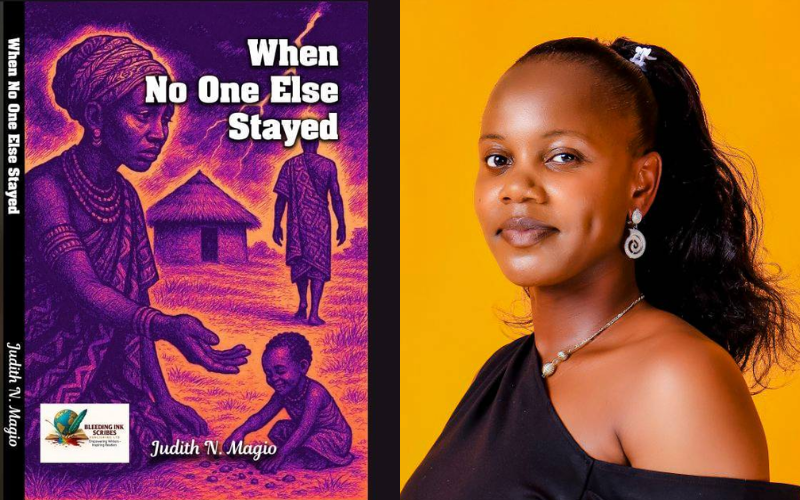In Nairobi’s Njiru estate, a girl once grew up attuned not only to the stories people told, but also to the silences that held what was left unspoken. Born in 1997, Judith Magio would later turn that sensitivity into a voice of her own: bold, searching, and unafraid to confront the silences that shape human lives.
Today, she is not only a teacher of English and Literature but also an emerging writer whose debut book, When No One Else Stayed, has already marked her out as a storyteller of unusual courage.
The novel tells the story of a single mother wrestling with loneliness, mounting bills and society’s sharp expectations, even as she nurtures her young daughter. It is, on the surface, an intimate tale of one woman’s struggle.
Yet beneath it runs a larger current, a tribute to countless single mothers who endure in the shadows, carrying their families forward with strength and grace.
For Judith, the book is as much an act of witness as it is a work of fiction: “silence itself becomes a language,” she has said, “one that carries both wounds and resilience.”
Magio’s approach to writing is less methodical than instinctive. She admits she rarely plots her endings in advance, preferring instead to follow where the story leads. “Writing, for me, is less about controlling the story and more about surrendering to it,” she explains.
This organic rhythm, where silence and pause are as essential as words, gives her work a quality of raw authenticity. Her first readers, a small circle of trusted confidants, help refine her drafts without reshaping her voice, ensuring that what emerges remains true to her vision.
Though her literary journey is only just beginning, Judith situates herself within a lineage of African and global voices who have taught her that writing can be both intimate and political.
Mariama Bâ’s So Long a Letter showed her that personal pain could also be a form of resistance. Nawal El Saadawi revealed how fearless truth-telling can unsettle entrenched silences.
Closer to home, Ngugi wa Thiong’o reinforced her conviction that telling our stories in our own languages is itself an act of reclamation. And from across the Atlantic, Maya Angelou became a compass, reminding her that words can turn pain into poetry, and poetry into healing.
Everyday Kenyan life remains her greatest inspiration: the chatter in matatus, the resilience of women in markets, the laughter of children at play, the hushed tensions within households. These ordinary details, filtered through her empathetic eye, lend her writing a texture that feels both local and universal.
But if Judith is bold on the page, she is equally pragmatic about the realities of publishing in Kenya. Bookstores often favour established names or imported titles, leaving little room for emerging voices. For young authors like her, visibility online also requires resources not always within reach. Yet she refuses discouragement. Through social media, grassroots engagement, and word-of-mouth, she has begun to carve her own space, building a readership one deliberate connection at a time.
“The struggle,” she reflects, “has made me closer to my readers because I know each connection is intentional.”
For Judith, art and activism cannot be separated. Her work does not shout; it insists. By giving voice to abandonment, silence and survival, she challenges a culture that often prefers to hide its pain.
When No One Else Stayed is thus both a story and a stance. A refusal to look away, and an invitation to face what hurts.
Looking ahead, Judith Magio hopes to be remembered not only for her stories but for the honesty with which she told them. Her debut is both a tribute and a beginning: a promise that her voice, once tuned to silence, will continue to speak for those who remain unseen.
